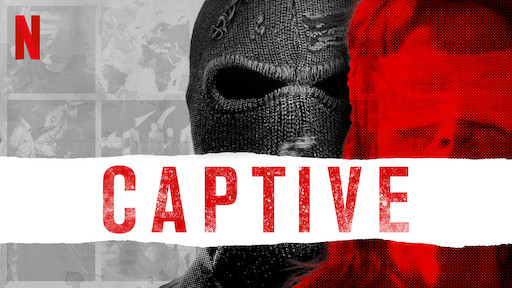Normally, if I watch something I like, I will mention it in a Thursday Rundown blog post. Occasionally, if I watch something that I feel is exceptional, I might devote an entire blog post to it (i.e. Wild, Wild Country). Tonight is one of those nights.
Listen up, if you have any interest in hostage situations, you need to give “Captive” on Netflix a chance. It is an eight-episode series that tells eight different tales of held-against-your-will, all-hope-is-lost situations involving some very unlucky people.

“Captive” on Netflix was really interesting.
From Ohio to Brazil to Somalia to Iraq and several more places, the documentary series will take you to some scary locations with evil individuals. The hour-long episodes will keep you in suspense as you desperately hope for positive outcomes.
But while the episodes will keep you on the edge of your seat, it is the inside look that will make it worth your while. From the negotiators to the kidnappers to the family members to the hostages, you will learn different perspectives, tactics, and motivations.
When trying to negotiate someone’s release, many times you are limited with what you can do and promise. A dose of creativity that goes beyond paying a ransom is needed. By watching “Captive” you will see how negotiators seldom give up and will do whatever is necessary to save a fellow human.
Go inside the head of a kidnapper. Learn how they got involved with the “industry,” how they manipulate and intimidate their victims, and how sometimes (but definitely not always) they might show compassion. That’s right, in some of these episodes they will have interviews with the real kidnappers themselves, giving a glimpse into the minds of some truly sick people.
Make no mistake about it, when these situations occur, family members are held hostage too. The documentary does a fabulous job showing the pain and uncertainty that loved ones are subjected to when a parent, child, or significant other is abducted. Sometimes, the family is catapulted into the role of chief negotiator, amplifying the unbearable stress that much more. You can’t help but feel for them when they are awakened every night at 2:30 a.m. to a phone call from the kidnappers with the latest threats and demands.
But of course the perspective from the hostages is what makes this documentary so captivating. To learn how someone could endure more than a year in some jungle or basement prison is fascinating, horrifying, and inspiring. The insight I received about how they engaged in their own psychological tactics to get the upper hand on their kidnappers was intriguing as well. The long-term effects on these people featured in the episodes varied and some of what you hear will surprise you.
Although the actions in many of the episodes are barbaric, the various moving parts in these unfortunate situations kept my attention. The context given and the participation from many of the key players involved made for riveting television. Give “Captive” a shot and let me know what you think. Don’t Blink.
